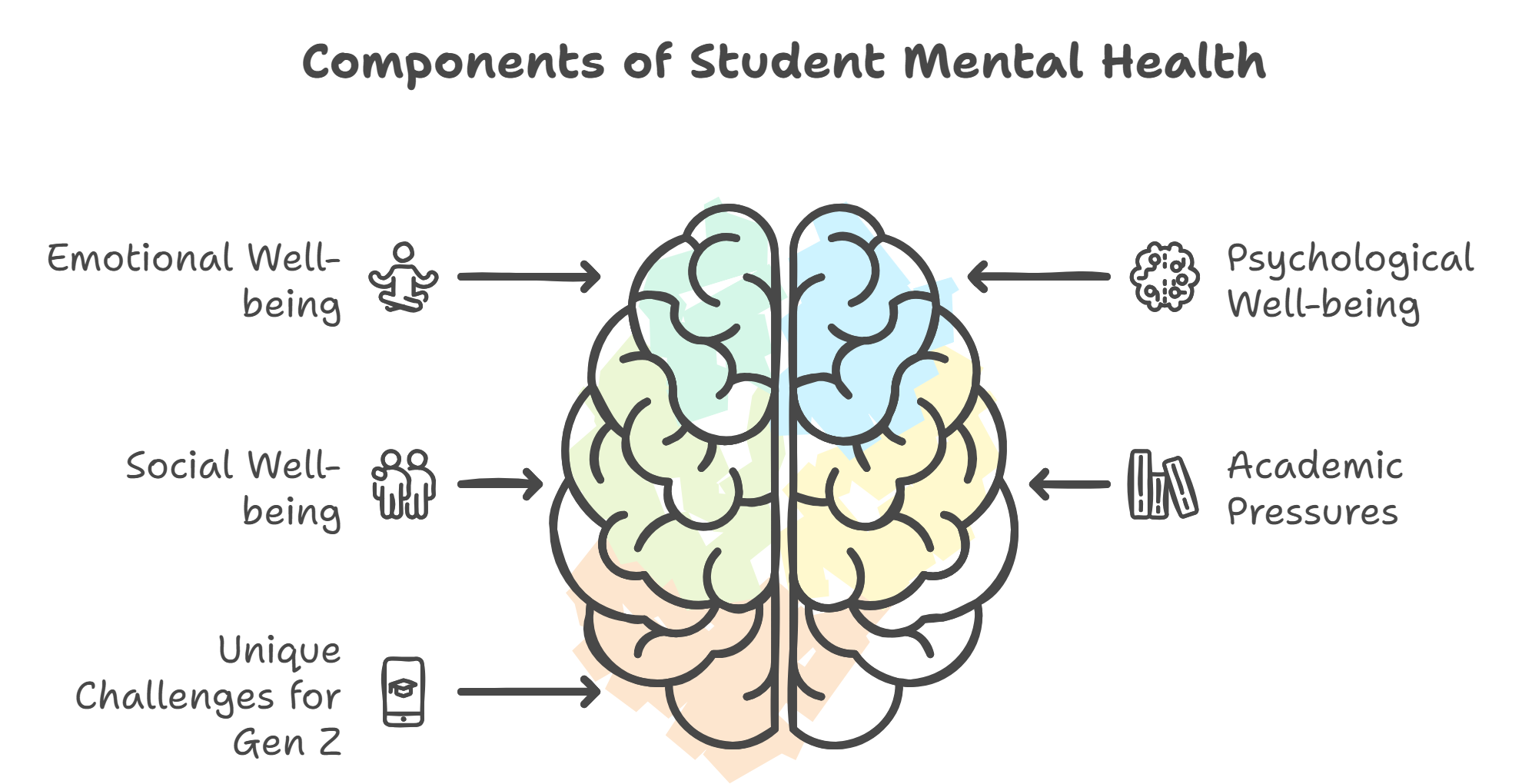Understanding and Prioritizing Student Mental Health: A Holistic Approach
 Pranay
Pranay
The last few years have brought significant challenges, impacting every aspect of our lives—especially mental health. Mental well-being touches every element of how we function in the world, influencing how we handle stress, make decisions, form relationships, and even how we perceive ourselves. Ensuring a strong mental health foundation isn't just about being free from illness; it's about thriving in all areas of life.
For students, mental health goes beyond simply avoiding stress or managing disorders. It’s about being able to perform at your best academically, engage socially, and manage the many challenges life throws your way. Understanding the basics of mental health, recognizing potential issues, and learning how to address them is crucial for every student, especially those already living with mental health conditions.
What Is Student Mental Health?
Mental health encompasses emotional, psychological, and social well-being. It influences how we think, feel, and act. For students, mental health plays an integral role in their ability to navigate academic pressures, social connections, and personal development. Just like physical health, mental health is essential throughout every stage of life, from early childhood to adulthood.
However, today’s college students—largely Gen Z—face unique challenges. This generation is more vocal about mental health issues, but they are also exposed to more stressors than previous generations. As such, understanding and addressing mental health challenges for Gen Z students is more important than ever.

The Current State of Student Mental Health
Across the globe, there’s growing concern over the mental health of college students. Studies since 2013 indicate that students are experiencing more severe mental health issues. According to a survey, 95% of college counseling directors report an increase in students dealing with significant psychological challenges. Anxiety and depression are on the rise, and many students are not aware of the importance of mental health care or where to turn for help.
This isn’t just a local issue—student mental health is a growing concern worldwide. Young adults, especially those transitioning into college life, are facing immense pressure. Many students feel lost, not knowing where to seek advice or how to manage their mental health effectively.
Myths and Misconceptions About Mental Health in Students
The stigma surrounding mental health remains one of the biggest barriers to seeking help. Many people still believe myths about mental health, such as:
Myth 1: People with mental health challenges cannot contribute meaningfully to society.
Myth 2: Student mental health issues are not as significant because their responsibilities are "less serious."
These misconceptions can be harmful, especially for students who are already feeling overwhelmed by academic and social pressures. Fortunately, as awareness around mental health continues to grow, more students are recognizing the importance of mental well-being.
How Mental Health Affects Students' Performance
Mental health has a profound impact on a student's academic performance. It can affect energy levels, concentration, memory, and overall motivation. Studies show that depression and anxiety can lead to lower grades, decreased participation, and even higher dropout rates. Students struggling with mental health issues often find it difficult to manage their academic workload, which can lead to a vicious cycle of stress, poor performance, and worsening mental health.
The Role of Environment: Why Your Accommodation Matters
One key aspect that can significantly influence mental well-being is the student’s living environment. Where you live can directly affect your mental health—whether it’s the noise level, roommates, or even the general ambiance of your living space. A comfortable, supportive environment can make all the difference in how well a student handles stress and anxiety. So, when choosing accommodation, it’s important to select a place where you feel safe and at ease.
Effective Mental Health Tips for Students
Maintaining good mental health involves taking proactive steps to ensure balance and well-being. Below are some mental health strategies that can help students stay on top of their well-being:
1. Adopt a Positive Attitude
One of the simplest ways to boost mental health is to cultivate a positive mindset. This doesn’t mean ignoring negative emotions—it means learning to acknowledge them and work through them constructively. By focusing on the positives and learning to reframe negative thoughts, students can reduce stress and foster resilience.
2. Exercise Regularly
Physical activity is a powerful mental health tool. Exercise stimulates the production of endorphins, the body’s natural mood enhancers. Whether it's yoga, jogging, or even a brisk walk, physical activity can greatly improve mood and reduce symptoms of anxiety and depression.
3. Practice Meditation
Meditation is an ancient practice with modern-day benefits. Just a few minutes of daily meditation can help reduce stress, improve concentration, and enhance overall mental well-being. Many apps offer guided meditation sessions, making it easy for students to incorporate this practice into their daily routine.
4. Get Enough Sleep
Sleep is essential for mental health. Students should aim for 7-9 hours of quality sleep each night to improve memory, focus, and mood. Establishing a bedtime routine and minimizing screen time before bed can improve sleep quality.
5. Utilize Campus Resources
Most campuses offer mental health support services, including counseling, wellness programs, and stress management workshops. Don’t hesitate to reach out to these resources when needed—they’re there to help you succeed.
6. Prioritize Self-Care
Self-care isn’t just a buzzword; it’s a necessity. Engage in activities that bring you joy, whether it’s reading, painting, or spending time with friends. Regularly taking time for yourself can prevent burnout and improve overall well-being.
7. Engage in Mental Health Exercises
Incorporate activities that enhance your mental wellness into your routine. Laughter, journaling, stretching, and listening to music can all foster positive energy and improve mood. Small steps, done regularly, can lead to significant improvements in mental health.
8. Develop Hobbies
Hobbies give students an outlet beyond their academic responsibilities. Engaging in activities that you enjoy—whether it’s sports, music, or art—can provide a mental break and improve overall well-being.
9. Maintain a Healthy Diet
What you eat affects how you feel. A balanced diet rich in nutrients can improve mood, boost brain function, and help manage stress. Avoid processed foods and sugar, and instead, focus on a diet rich in whole grains, fruits, vegetables, and healthy fats.
10. Build a Support Network
Having strong relationships is essential for mental well-being. Make an effort to connect with family, friends, and peers. These relationships provide emotional support and help you navigate difficult times.
Conclusion: The Importance of Mental Health for Students
Mental health is just as important as physical health. Students should prioritize their well-being, both for academic success and for a happier, more fulfilling life. By following the mental health tips outlined above, students can navigate the challenges of college life while maintaining their mental wellness. Remember, taking care of your mind is an investment in your future.
Subscribe to my newsletter
Read articles from Pranay directly inside your inbox. Subscribe to the newsletter, and don't miss out.
Written by
